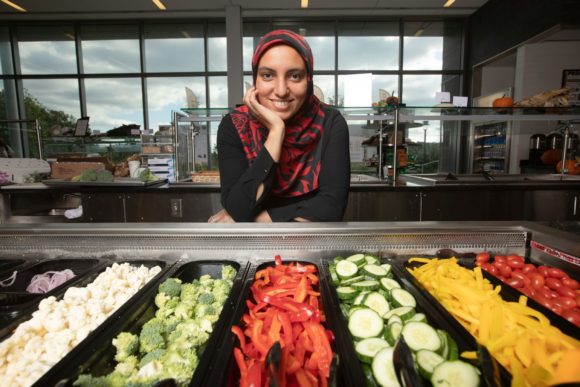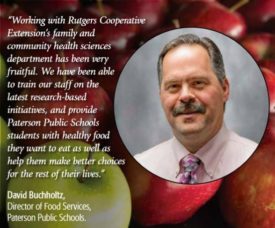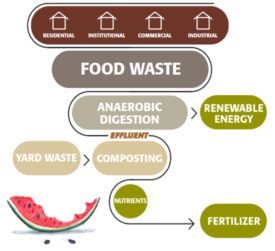
The Paterson school district saves approximately 91,000 pounds of food, resulting in a savings of $76,000 — Sara Elnakib, Family and Community Health Educator.
In addition to the economic cost of food, there is the additional cost in resources such as land, water, labor, and transport that is not often factored into the cost of food waste. With global solid waste generation accelerating, and organic waste contributing significantly to the problem, continued use of landfills for organic waste is unsustainable. NJAES is tackling this issue cooperatively on several fronts, from public school food service departments to anaerobic digestion energy solutions.
 The Rutgers Department of Family and Community Health Sciences recently partnered with Paterson Public Schools to reduce food waste. Food service professionals from 15 schools participated in training focused on improved menus, more food choices, and the environmental cues (signage, food placement, food presentation) we use to make those choices. The training resulted in a 14 percent reduction in food waste in the district and over 350 pounds of food saved. Results also showed that kids ate better and healthier.
The Rutgers Department of Family and Community Health Sciences recently partnered with Paterson Public Schools to reduce food waste. Food service professionals from 15 schools participated in training focused on improved menus, more food choices, and the environmental cues (signage, food placement, food presentation) we use to make those choices. The training resulted in a 14 percent reduction in food waste in the district and over 350 pounds of food saved. Results also showed that kids ate better and healthier.
Food Waste = Clean Energy and Nutrients
 What can be done with organic waste material that does end up in the trash? The Rutgers EcoComplex—designated a Clean Energy Innovation Center—has been researching the viability of converting organic waste to low-carbon energy and recovering nutrients through anaerobic digestion. This process would generate clean energy and produce clean nutrients that could be used for agricultural purposes.
What can be done with organic waste material that does end up in the trash? The Rutgers EcoComplex—designated a Clean Energy Innovation Center—has been researching the viability of converting organic waste to low-carbon energy and recovering nutrients through anaerobic digestion. This process would generate clean energy and produce clean nutrients that could be used for agricultural purposes.
Editor’s Note: this article originally appeared in the 2018 New Jersey Agricultural Experiment Station Annual Report.

